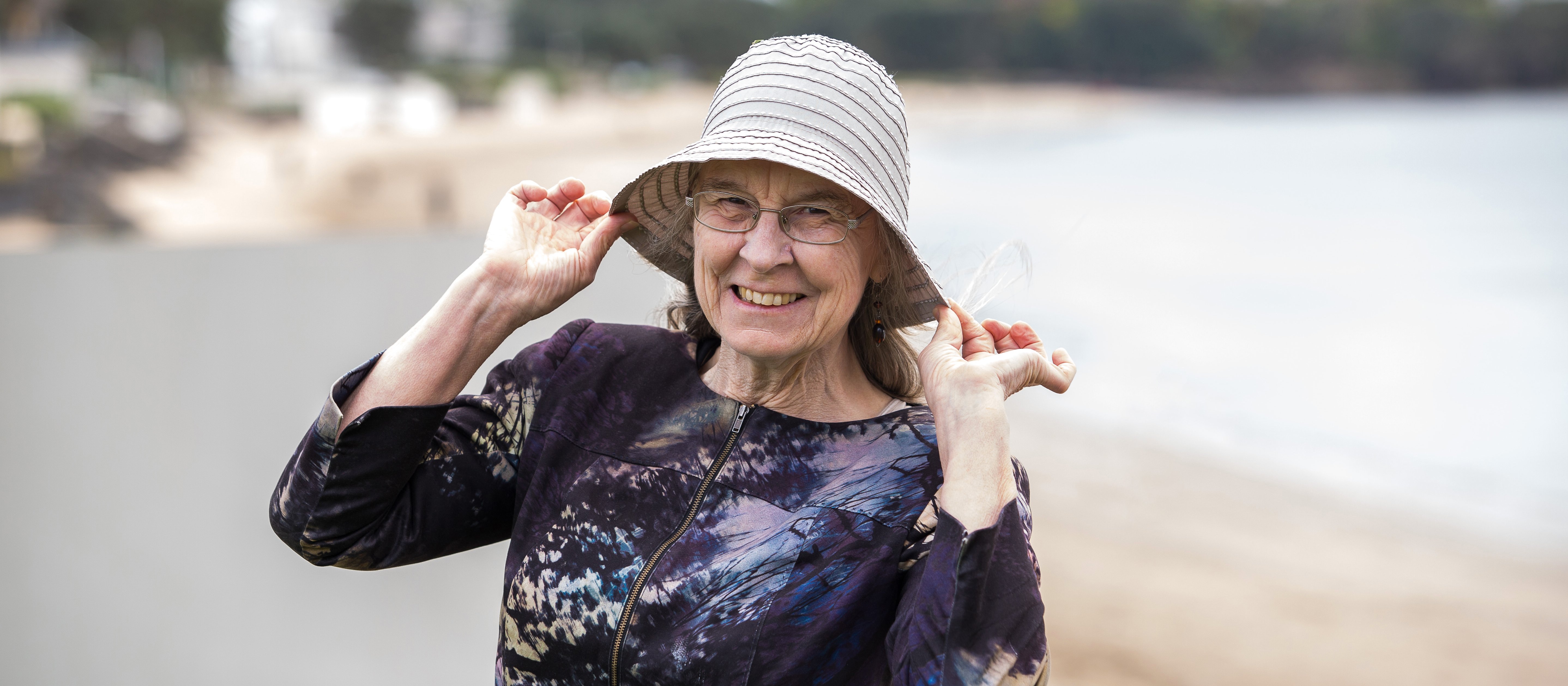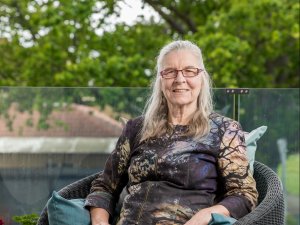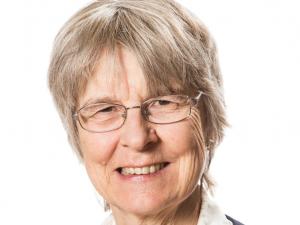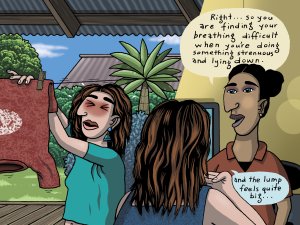Otolaryngologist, head and neck surgeon Francis T. Hall discusses the evaluation of thyroid nodules, which primarily aims to determine the likelihood of malignancy. He then reviews the treatment of thyroid nodules and thyroid cancer, including recent advances in management
Skin in the game: Dermatologist Amanda Oakley’s unwavering dedication to progress
Skin in the game: Dermatologist Amanda Oakley’s unwavering dedication to progress

Kia ora, please enjoy our Summer Hiatus selection of stories and comment from throughout 2023, curated by our editorial team. This article was first published on 25 October. We will be back from our summer break on 15 January. Happy reading
Chosen by Patrice: Amanda Oakley stepping away from her role as dermatology columnist for New Zealand Doctor Rata Aotearoa after almost 20 years is the end of an era. We couldn't miss out on the chance to talk to her about her life in dermatology and her latest endeavours, as she wrangles with AI - and grandkids - in this next stage of her career
I got a position at Auckland Hospital as registrar, and within the first two or three days, I was completely hooked
Amanda Oakley has no plans to slow down. The opposite is probably true.
This issue of New Zealand Doctor Rata Aotearoa marks her last as dermatology columnist. But with a new book at the publisher’s and another on the way, she has yet to set down her pen.
A pen is probably too low-tech a device for Dr Oakley, who is on sabbatical working on a generative AI project, exploring how to implement and train artificial intelligence to diagnose, recommend and prescribe for dermatology patients in a primary care setting.
She works three days a week in Waikato Hospital, volunteers for DermNet, the global dermatology resource she co-founded in the 1990s, and has added grandparenting duties to her week, basing herself in Auckland for four days to pick up her grandkids on Thursdays and Fridays. She jokes that living in a new townhouse near the beach is a ploy to encourage grandchildren to visit when they become teenagers.
“Dropping New Zealand Doctor is because I’ve got far too much to do,” she says, describing her columns as a burden and a pleasure. Dr Oakley has been writing for the newspaper since 2005, although when digging through past clippings, she came across a one-off from 1997.
An interest in writing was partially forced on her. During her training at Auckland Hospital in the 1980s, a consultant was asked to write an article but passed it on to Dr Oakley.
“I made a real hash of it,” she says.
“It was terrible. I had no idea how to write, and so I thought, ‘Oh well, I’m not going to do that again’.”
After she became a consultant herself and was asked to write an article, she attended a course by Wellington GP and writer Ian St George.
“In a few hours, I learned how to write, which was really quite extraordinary. And then I started being more enthusiastic when people [asked] would I write something, and started to write more and more, and realised I actually quite liked it.”
She now has almost two decades of columns and several books. Another – Oral Dermatology – will be published next year, and she is about to start writing a beginner’s guide to dermoscopy.
Growing up in Surrey, England, Dr Oakley was familiar with medicine as her father, uncle and brother were all doctors. She took a year off after leaving school, initially planning to study psychology but later securing a place to study medicine at Bristol University.
She knew within a few days of starting the course that medicine was the right field for her. But she hadn’t considered a specialty. It wasn’t until her PGY2 year – in New Zealand with an expiring visa – that she decided to go into dermatology.
“The immigration officer gave me a shortlist of medical specialities that would ease the next visa,” she says.
Dermatology was on the list, and having sampled a bit of dermatology during her elective year in Trinidad and Tobago and remembering a conversation with a colleague who had started the pathway, she decided to give it a go.
“I got a position at Auckland Hospital as registrar, and within the first two or three days, I was completely hooked. That was December 1982 – just the other day.”
The immigration officer had given her another list of potential options for remaining in the country – one was to marry a New Zealander. “So, I did that as well,” she says with a laugh.
Now separated from her Kiwi husband, Dr Oakley has two daughters in their 30s and four grandchildren aged five and under.
She hopes to spend more time with her family and be actively involved in her grandchildren’s lives.
“I’m trying to divest jobs that I don’t really need to do. That’s just worked out quite tricky because there’s so much going on. As soon as I come off one committee, I seem to be on another one.”
What started as something of a visa requirement has turned into her life’s work – she insisted on wearing a hat for the outdoor photographs to accompany this article, despite the photographer trying to persuade her otherwise. Her most famous achievement is probably DermNet, co-founded in the early days of the internet. The idea was sparked by a quirky sponsored lunch during a New Zealand Dermatological Society meeting in Napier, when she was working at Waikato Hospital, she says.
“[The pharmaceutical company], instead of having someone speak on psoriasis, had someone speak on the internet, and he did it by cleverly doing a show-and-tell…[he covered] how you could show dermatology.”
Impressed, Dr Oakley approached the sponsor, proposing a collaboration, and in 1996, she and her colleagues, Drs Mark Duffill and Marius Rademaker, with the backing of the New Zealand Dermatological Society, officially launched the DermNet website.
As editor-in-chief, she became “somewhat obsessed” with building what she thought of as an online public library for dermatology before the days of Google and Wikipedia.
She initially envisioned the target audience as patients, but that quickly changed to health professionals: “A patient may visit a website once, but a health professional will go back and back and back and back.”
Specifically, her target was Kiwi GPs. However, the website attracted attention outside of New Zealand, with most users coming from the US. DermNet is now the world’s leading free dermatology resource.
Primary care is still Dr Oakley’s target audience, as that’s the first port of call for most patients with skin problems. However, she says primary care doctors often misdiagnose skin conditions, with only 30 to 50 per cent of GP diagnoses being the same as a dermatologist.
Referrals via the teledermatology system at Waikato Hospital – where GPs can send a referral marked urgent or non-urgent with attached images for the dermatologists to assess and decide next steps – often are inaccurately prioritised. Some marked “non-urgent” contain melanomas or serious skin conditions that should have been considered a priority. But, due to the hundreds of referrals received each month, they drop down the list.
On sabbatical, Dr Oakley hopes to combine her passion for using technology to solve dermatology problems, cut waiting lists and speed up diagnoses.
She was granted a sabbatical in 2017 to utilise machine learning and algorithms to diagnose common skin conditions, but has only taken it up this year. Events intervened. There was the death of colleague Anthony Yung in 2018 and then the COVID-19 pandemic.
“At that time, I had the vision that DermNet would have an artificial intelligence image-based product and I was going to explore the best way of managing that,” she says. The idea won her the 2017 Clinicians’ Challenge Active Award from the Ministry of Health.
However, AI has fast developed since 2017 and, in 2023 – when hardly a week goes by without reading about generative AI’s role – a simple AI diagnostic tool is no longer enough, Dr Oakley says.
“That concept is proven, especially for the role of skin cancers”, with several companies offering diagnostic programmes.
Skin cancer is the low-hanging fruit, as the images are generally clear and consistent. Other skin conditions are trickier.
“It’s not good enough to give us the diagnosis. We’ve got to look at what are we going to do with that diagnosis,” she says. “We’ve got to diagnose all dermatology, not just suspected skin cancers. We’ve got to provide the referrer and the patient with consistent, accurate, personalised information.”
AI could help take images correctly, ensuring they are in focus and not too close, and create more patient buy-in with personalised information. It could also offer recommendations and advice to GPs.
Getting this AI-supported referral system going is the focus of her sabbatical. She hopes for a national rollout with an emphasis on supporting primary care.
“It’s so exciting. I’m really filled with enthusiasm for this project.”
1979
Graduated from Bristol University
1982
Started as a registrar at Auckland Hospital and was instantly hooked on dermatology and also started writing
1987
Started work as a dermatologist at Waikato Hospital
1996
Co-founded and launched DermNet
2017
Won the Lifetime Achievement Award at the New Zealand Charity Technology Awards for her tenure as creator and editor-in-chief of DermNet
2017
Won the Ministry of Health’s Clinicians’ Challenge in the active project/development category for the proposal to train artificial intelligence software to recognise skin diseases in images through pattern recognition
2018
Made a Companion of the New Zealand Order of Merit for services to dermatology in the Queen’s Birthday Honours










![New Zealand Doctor Rata Aotearoa editor Barbara Fountain, RNZCGP president elect and Tauranga-based specialist GP Luke Bradford, Ministry of Health clinical chief advisor rural health Helen MacGregor, and Health New Zealand Te Whatu Ora clinical director primary and community care Sarah Clarke [Image: NZD]](/sites/default/files/styles/thumbnail_cropped_100/public/2025-05/1.%20Barbara%20Fountain%2C%20Luke%20Bradford%2C%20Helen%20MacGregor%20and%20Sarah%20Clarke.jpg?itok=091NETXI)
![Ngāti Porou Oranga specialist GP Elina Pekansaari and Te Nikau Hospital specialist in general practice and rural hospital medicine David Short [Image: NZD]](/sites/default/files/styles/thumbnail_cropped_100/public/2025-05/2.%20Elina%20Pekansaari%20and%20David%20Short.jpg?itok=h5XfSBVM)
![Locum specialist GP Margriet Dijkstra and OmniHealth regional operations manager (southern) Patricia Morais-Ross [Image: NZD]](/sites/default/files/styles/thumbnail_cropped_100/public/2025-05/3.%20Margriet%20Dijkstra%20and%20Patricia%20Morais-Ross.jpg?itok=jkrtRfJC)
![Golden Bay dairy farmer and dairy industry health and safety doctoral student Deborah Rhodes, and Golden Bay Community Health specialist GP Rachael Cowie [Image: NZD]](/sites/default/files/styles/thumbnail_cropped_100/public/2025-05/4.%20Deborah%20Rhodes%20and%20Rachael%20Cowie.jpg?itok=oM0_GcJc)
![Hauora Taiwhenua clinical director rural health Jeremy Webber, Australian College of Rural and Remote Medicine president Rod Martin and Observa Care director of business operations Deborah Martin, the wife of Dr Martin [Image: NZD]](/sites/default/files/styles/thumbnail_cropped_100/public/2025-05/5.%20Jeremy%20Webber%2C%20Rod%20Martin%20and%20Deborah%20Martin%2C%20the%20wife%20of%20Dr%20Martin.jpg?itok=P_aGmX_H)
![Spark Health chief executive John Macaskill-Smith and client director Bryan Bunz [Image: NZD]](/sites/default/files/styles/thumbnail_cropped_100/public/2025-05/6.%20John%20Macaskill-Smith%20and%20Bryan%20Bunz.jpg?itok=5yJvVZ0I)
![Associate dean (rural) Kyle Eggleton, third-year medical student Roselle Winter, and second-year pharmacy student Alina Khanal, all from the University of Auckland [Image: NZD]](/sites/default/files/styles/thumbnail_cropped_100/public/2025-05/7.%20Kyle%20Eggleton%2C%20Roselle%20Winter%20and%20Alina%20Khanal.jpg?itok=RQLd3TEs)
![Health New Zealand Te Whatu Ora clinical editor and specialist in general practice and rural hospital medicine Anu Shinnamon, and Whakarongorau chief clinical officer Ruth Large [Image: NZD]](/sites/default/files/styles/thumbnail_cropped_100/public/2025-05/8.%20Anu%20Shinnamon%20and%20Ruth%20Large.jpg?itok=i5TMswY9)
![Te Kahu Hauora Practice specialist GP Jane Laver and Ngāti Kahungunu ki Tāmaki-nui-a-Rua chief operations manager Tania Chamberlain [Image: NZD]](/sites/default/files/styles/thumbnail_cropped_100/public/2025-05/9.%20Jane%20Laver%20and%20Tania%20Chamberlain.jpg?itok=jtMklaCZ)